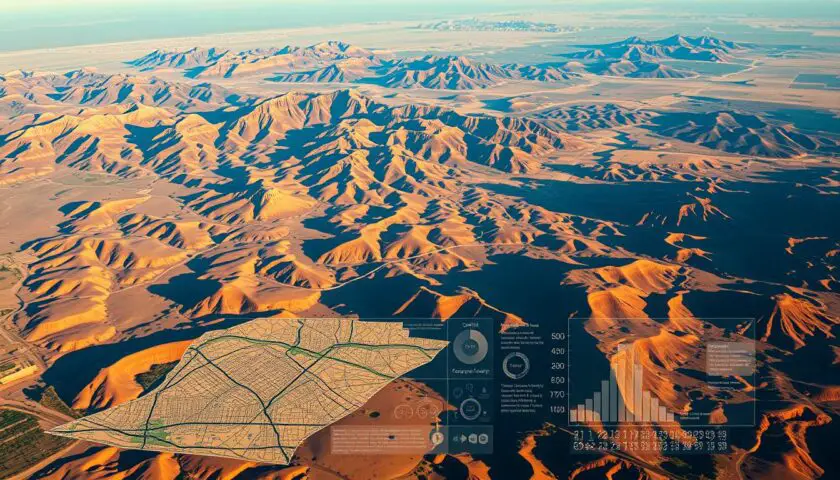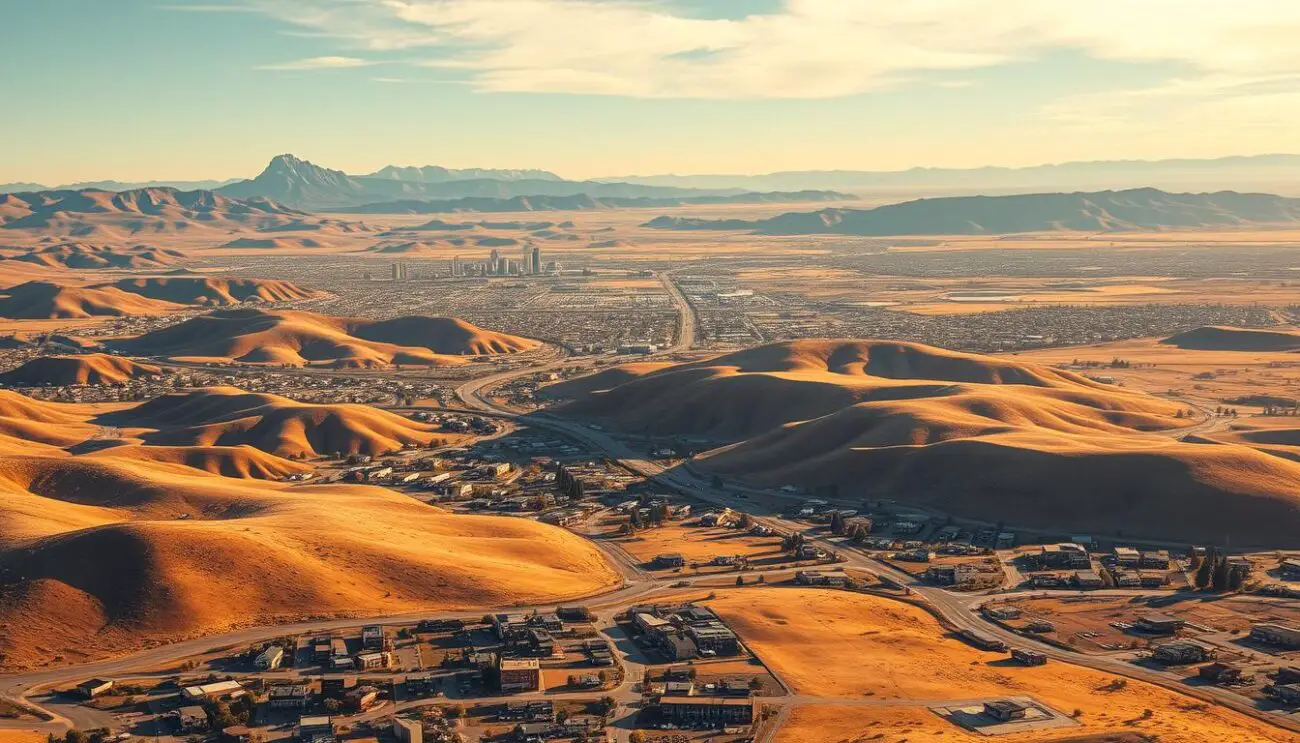Utah’s population is expected to grow from 3.5 million in 2024 to over 4 million by 2033. This growth rate of 1.5% per year means an increase of about 500,000 residents by 2033. This makes the topic of Utah’s population in 2025 very important.
As Utah’s population rises, it’s key to look at demographic trends and projected growth. This helps us understand how it will affect the state’s economy, infrastructure, and resources.
Knowing about Utah’s population in 2025 is crucial for everyone. The 1.5% growth rate means more households, jobs, and services needed. By 2033, with a population of 4 million, we must consider the impact on demographics and growth.
Key Takeaways
- Utah’s population is expected to grow from 3.5 million in 2024 to over 4 million by 2033.
- The average annual growth rate for Utah’s population is projected at 1.5%.
- The state’s population growth will lead to an increase in the number of households, employment opportunities, and demand for services.
- Utah demographic trends and projected population growth utah will have significant implications on the state’s economy, infrastructure, and resources.
- The growth rate of 1.5% per year will lead to an increase of approximately 500,000 residents by 2033.
- Understanding utah population 2025 is crucial for policymakers, businesses, and individuals to prepare for the future.
- Utah’s population growth will have a significant impact on the state’s economy, with an expected increase of 330,000 jobs by 2033.
Current Population Trends in Utah
Utah’s population is growing fast, with estimates showing it could add one to two-and-a-half million people by 2050. The state is young, diverse, and has a strong economy, drawing in newcomers. According to population statistics utah, it has seen steady growth, with a 1.7% annual increase from 2010 to 2022.
Between July 1, 2023, and July 1, 2024, Utah welcomed over 60,000 new residents. This brought the total population to 3.5 million. The state’s growth rate of 1.8% during this time ranked it third in the U.S. for population increase. Net migration was the main driver of this growth, with international migration making up most of it. The
Historical Population Growth Patterns
Between 2010 and 2020, Utah saw the highest percentage growth in the country. But in 2023, it ranked ninth with a 1.1% growth rate. Natural increase, or births over deaths, added nearly 24,000 people. The percentage of adults in Utah also rose, from 72.7% in 2023 to 73.4% in 2024.
Recent Demographic Shifts
Utah’s population is expected to increase by half a million in the next nine years. By 2033, it could reach over 4 million. The median household income has jumped from nearly $60,000 to nearly $100,000 in the last decade. In Provo, 60% of homes are rentals, and 40% are owned.
For every single-family lot approved in Provo, about nine apartment or townhouse units are approved. This has been the case for the last five to seven years.
Utah Population 2025: Projection Methodology
The estimates of Utah’s population come from a mix of past data, trends, and local insights. Demographers use different methods to forecast growth. These include trend analysis and cohort-component methods. The foundation for these forecasts is the Utah census data, which is then fine-tuned with local information.
The process of making these projections involves several steps. Here’s what they are:
- Looking at past population trends
- Studying current demographic trends
- Thinking about local economic and social factors
These estimates help with planning and decision-making at both state and local levels.
Recent data show Utah needs about 28,000 new homes each year to match growth. This shows how crucial accurate population estimates and census data are. They guide decisions in housing and urban planning.

Key Factors Driving Utah’s Population Growth
Utah’s population is growing due to several key factors. These include natural increase, migration, economic growth, and housing development. The state’s population is expected to keep growing, with steady projected population growth utah rates. The utah demographic trends show a diverse population with a strong economy, drawing in new residents.
The main drivers of Utah’s population growth are:
- Natural population increase: Utah’s birth rate is higher than the national average, leading to a natural increase in population.
- Migration patterns: Utah sees a lot of people moving in, attracted by work or education opportunities.
- Economic growth: Utah’s strong economy, with low unemployment and high pay, draws new businesses and residents.
- Housing development: The growing population boosts demand for new housing, with many construction projects underway.
Understanding these factors is key to predicting population forecasts utah. It helps in planning for the state’s future growth and development. By analyzing these trends, policymakers can make informed decisions to support Utah’s growth and prosperity.
| Year | Population | Growth Rate |
|---|---|---|
| 2022 | 3.3 million | 1.5% |
| 2023 | 3.4 million | 1.8% |
| 2024 | 3.5 million | 1.9% |
Conclusion: Impact and Implications of Utah’s Projected Growth
Utah’s population is set to nearly double by 2034, reaching over 4 million people. This growth brings both chances and hurdles. The projected growth will affect Utah’s economy, infrastructure, and resources. Everyone must work together to handle this demographic shift.
New residents will boost Utah’s economy, creating more jobs and international connections. But, a drop in college-age people starting in 2027 could challenge schools. They need to keep students and attract more talent.
The growing population will also put a strain on Utah’s housing and transportation. With high home and rental prices, finding affordable housing is key. Improving public transit and tackling homelessness are also crucial.
Utah’s diverse economy needs careful management of resources like water and energy. By planning ahead, Utah can seize growth opportunities and keep its quality of life high for everyone.
FAQ
What is the current population of Utah and how has it changed over time?
Utah’s population is about 3.3 million as of 2022. The state’s population has grown steadily over the years. It has an annual growth rate of 1.5-2%.
This growth comes from more births than deaths and people moving to Utah.
What are the key demographic trends shaping Utah’s population?
Utah’s population is younger, with a median age of 31. The state has high fertility rates and sees a lot of people moving in from other places.
Utah is also becoming more diverse, with more Hispanics and Asians.
How is Utah’s population projected to change by 2025?
By 2025, Utah’s population is expected to hit 3.6 million. This is a 9% increase from today. It’s due to more births and people moving to Utah.
What are the primary factors driving Utah’s population growth?
Utah’s growth is driven by a high birth rate and people moving from other states. The state’s strong economy also attracts new residents.
Jobs, affordable housing, and a family-friendly environment are key reasons for the boom.
How is Utah’s population growth expected to impact the state’s economy, infrastructure, and resources?
Utah’s growth will challenge its economy, infrastructure, and resources. Housing, transportation, education, and water will need more attention.
But, the influx of new people could also boost the economy and innovation.
Source Links
- https://gardner.utah.edu/news/utah-is-projected-to-add-over-500000-new-residents-in-the-next-10-years/
- https://www.ksl.com/article/51151997/utah-growth-trend-continues-state-expected-to-surpass-4m-mark-by-2033
- https://www.sltrib.com/news/2024/11/12/will-utah-population-growth-mean/
- https://ksltv.com/local-news/utah-returns-to-top-5-in-growth-as-us-population-soared-in-2024/718544/
- https://universe.byu.edu/metro/utahs-population-experiences-major-growth-impacts-housing-market
- https://utahnewsdispatch.com/2024/10/22/utah-legislature-consider-statewide-housing-plan-upzoning-in-2025/
- https://www.utah.gov/pmn/files/1190569.pdf
- https://nchstats.com/utah-top-growing-us-state/
- https://utahnewsdispatch.com/2025/01/13/utah-economy-outlook-2025-immigration-housing-tariffs/
- https://d36oiwf74r1rap.cloudfront.net/wp-content/uploads/2025/01/ERG2025-Overview-RB-Jan2025.pdf
- https://gardner.utah.edu/news/utah-college-age-population-will-soon-shift-from-high-growth-to-a-season-of-decline/
- https://www.wolfnest.com/blog/utah-housing-market-forecast-2025-key-takeaways-from-2024s-economic-trends
- https://magazine.utah.edu/issues/winter-2024/a-new-utah/
I am Lazar Bojic, an established professional in digital marketing with almost a decade of experience. Specializing in an array of niches has been my main strength as a content creator. Besides being a content writer, I have participated in creating various other content types, including infographics and script writing for video content creators, across numerous niches. Among my standout works, content creation at wikibiography.in certainly holds a special place.

